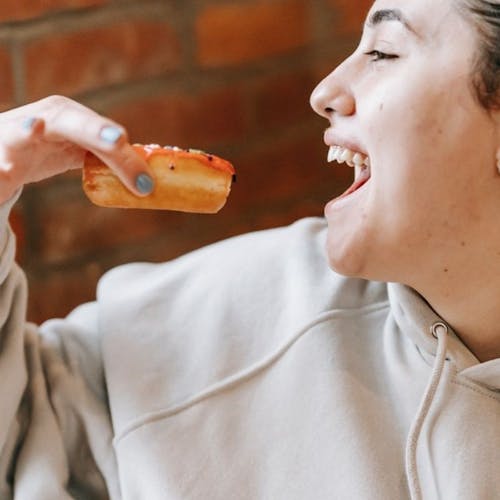This website uses cookies to enhance the user experience. By using Yoppie you are agreeing to our use of cookies.
Period Poop: How Menstruation Affects Your Digestive System
Written by Yoppie
11 Sep 2020
What even is period poop? 💩
Pooping with a tampon in 🩸
How to beat the period poop
When to see a doctor 🩺
It’s time to talk about ‘that which shall not be named’. Nope, worse than Voldemort… it’s those pesky period poops. Yoppie’s not afraid to talk about the icky stuff, so we thought it was time to address this mysterious phenomenon that ranges from mildly inconvenient to downright disgusting.
What even is period poop? 💩
You may have experienced some iffy digestion while on your period, and if you’re one of the not-so-lucky ones, the occasional ‘period poop’. Your digestive system is affected by your menstrual cycle due to fluctuating hormones, and sometimes it’s tough to decipher between period cramps and digestive discomfort, since cramps often feel like pressure in the abdomen, and both can bring on contractions around the uterus and bowel area.
All this is caused by prostaglandins, a group of lipids that control processes like blood flow, formation of blood clots, and induction of labour. That’s right, sometimes it’s hard to tell if you’re in labour or just about to poop your pants - aren’t periods fun?!
Not everyone experiences symptoms quite as dramatic as this - although some of the stories in this Cosmo roundup go into heavy detail - we love it! One study found 73% of respondents experienced period-related gastrointestinal symptoms ranging from more frequent bowel movements (1), to constipation or diarrhoea. IBS sufferers or those with other digestive issues could experience worse symptoms like abdominal pain and excessive diarrhoea during this time.
Here are some things you might notice during your period:
When you gotta go, you gotta go!
Prostaglandins are responsible for your increased frequency of bowel movements, as cells in the lining of the uterus produce more prostaglandins before your period, which stimulate muscles in your uterus to help it contract and shed its lining. Excess prostaglandins enter the bloodstream and can do the same to your bowels (2). Hence, period poop.
Smelly poo
… smellllly poo, what are they feeding you?! Hormones are typically the culprit of period poop, but dietary changes can also be blamed. Progesterone increases feelings of hunger and causes cravings for certain foods (chocolate, anyone?). An increased intake of junk food is bound to have negative effects on your bowels. You know; smelly farts, smelly poos, all that stuff.
Feeling ‘backed up’
Feel constipated at certain points during your cycle? Once again we can blame hormones for this. Low prostaglandins and high progesterone leads to slow digestion and a lot less poopin’ (2). If this happens to you, up the fibre in your diet around your period.
The ‘D’ word
More likely during your period is diarrhoea, thanks to excess prostaglandins making everything in your belly contract (2). What fun! Having diarrhoea and your period at the same time can make things rather messy, and losing blood and fluids can affect your energy levels, so it’s important to take it easy, drink a lot of water to boost hydration levels, and maybe cut the caffeine out for a while.
Rocking the bloat
Cravings can be the cause of smelly poos, but they can also be responsible for mild to severe bloating (2). Excessive sugar, greasy food, and fizzy drinks can all make bloating much worse, but you will know your own bloat triggers, so try to limit those particular foods around this time and substitute some gut-friendly foods and herbal teas to calm the bloat.
Pooping with a tampon in 🩸
When you’re using your pelvic muscles to poop, it can feel like your tampon may shoot out, Nerf gun-style. Perhaps it’s even happened a few times. Tampons can become dislodged if you strain for a poo, so some women prefer to remove and replace with another when they’re done.
If you’d rather not waste a fresh tampon, you might want to eat foods that prevent constipation so stools are easier to pass. If you have diarrhoea and some poo ends up on your tampon string, you should always change this to avoid harbouring harmful bacteria that can cause vaginal infections.
How to beat the period poop
- Here are a few things you can do to make period poop a little less intense every month:
- Keep track of digestion: Learn which symptoms are likely to recur so you can plan ahead, eat accordingly, and if necessary, give your GP a log of your symptoms
- Eat more fibre: Adding fruits, vegetables and whole grains to your diet can keep your system regulated
- Get physical: Exercise may be the last thing on your mind during your period, but moving around helps relieve bloating and discomfort
- Take ibuprofen: Useful for cramps, and it acts as a prostaglandin inhibitor to lessen symptoms
- Manage anxiety – we know that this can manifest itself by worsening symptoms like diarrhoea. Techniques like hypnosis, and CBT can be effective at help these feelings too (2).
When to see a doctor 🩺
Period poop should never get in the way of daily life, so if your symptoms are affecting you more than they should, talk to your GP for advice on what you can do to help the situation, and discuss medication that may help, like hormonal birth control to reduce PMS symptoms.
Also, talk to them about any severe symptoms so they can rule out conditions like endometriosis, fibroids, polycystic ovary syndrome (PCOS) and more. Bowel issues like IBS or inflammatory bowel syndrome can also flare up during your period. If in doubt, go speak to them - and just call them gastrointestinal issues if saying ‘period poop’ makes you squirm!
Do you suffer from the dreaded period poop?! Let us know how you manage it, over on Instagram at @itsyoppie! Don't forget that our personalised period subscription box can get organic cotton tampons, PMS supplements, and much more, delivered through your letterbox. That's a few less things to worry about each cycle!
Fact checked by Doctor Brooke Vandermolen.
Section jump
Back to top
Subscribe To Our Newsletter
YOPPIE





© 2026 Yoppie is a registered trademark of Phlo Technologies Ltd.
Yoppie's supplements are not a substitute for a varied diet and healthy lifestyle and are not intended to diagnose, treat, or cure any disease. If you are pregnant, breastfeeding, have a medical condition or are under medical supervision, please consult with your doctor before taking any of our products.






